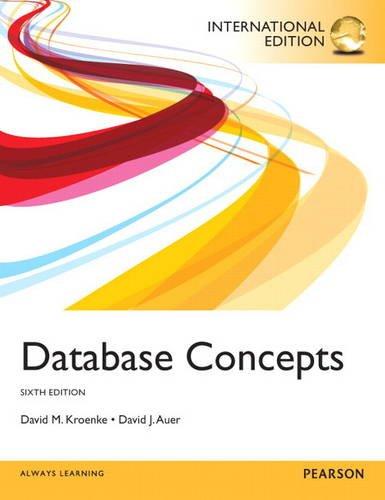Question
C++ Programming: A bag is a data structure that handles duplicate items with a counter rather than a new entry. The UML for a bag
C++ Programming:
A bag is a data structure that handles duplicate items with a counter rather than a new entry. The UML for a bag node might look like this. Well keep it simple and make it a struct.
| BagNode |
| + BagNode * : next + dataValue: string + dataCount: int |
The first time an instance of a string is inserted, dataValue contains the string and dataCount is set to one. If another instance of that same string is inserted, dataCount is incremented. The remove operation decrements the counter until there is only one left; then on a subsequent remove the entire node is removed (or, as actual removal is expensive simply set the count to zero). The traversal displays both the string and the count if it is greater than one; for example
Adam
betty (2)
Diane (4)
fred
Ordering strings produces another issue; the relational operators use ASCII values so
betty < Diane
is false when it should be true. Youll need to write a function that performs lexicographic comparison of strings, as we desire our traversal to be in lexicographical order.
Your program should perform the following tasks:
Display a friendly greeting to the user
Prompt the user for the name of a file that contains whitespace-delimited text
Accept that file name and attempt to open the file
If the file fails to open, display an appropriate error message and exit
Process the file by
reading the next word in the file
removing any leading or trailing punctuation
inserting the remaining word into the bag
Close the file
Prompt the user for another file name, for output
Accept that file name and open the file
Dump the traversal of the bag into that file and close the file
Your program should accept the names of the files as command-line parameters. If two file names are given, process the first and dump the traversal into the second. If only one file name is given, process the file and dump the traversal to the console. If no command-line parameters are given, prompt for both as described above.
The instructor will run your program against both small and large flat-text files, such as Moby Dick or The Oxford English Dictionary. Try it with the short story Bottle Party by John Collier (flat text available online) and your program might crash in a surprising way. Why? How would you fix it?
Step by Step Solution
There are 3 Steps involved in it
Step: 1

Get Instant Access to Expert-Tailored Solutions
See step-by-step solutions with expert insights and AI powered tools for academic success
Step: 2

Step: 3

Ace Your Homework with AI
Get the answers you need in no time with our AI-driven, step-by-step assistance
Get Started


